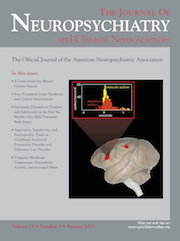To the Editor: Behavioral-variant frontotemporal dementia (bvFTD) produces complex combinations of challenging behaviors, including disinhibition, apathy, loss of empathy, perseverative/compulsive behaviors, hyperorality, and executive dysfunction.
1 Since there are no United States Food and Drug Administration-approved treatments for bvFTD, symptom-targeted off-label pharmacotherapy is commonplace. These treatments are often modeled on those provided to persons with other neurodegenerative dementias, including Alzheimer’s disease (AD).
Unlike in AD, cholinergic neurons are relatively preserved in bvFTD
2 and there is no a priori rationale for the use of these drugs in persons with this condition.
3,4 In fact, administration of cholinesterase inhibitors to individuals with intact cerebral cholinergic systems may impair attention, processing speed, memory, and executive function.
5 Cholinesterase-inhibitor treatment of persons with bvFTD therefore risks worsening cognition and functional status. Apropos of this concern, we present a case of reversible donepezil-induced confusional state in a patient with autopsy-proven bvFTD.
Case Report
A previously healthy, 43-year-old man developed apathy, verbal and behavioral disinhibition, perseveration, and executive dysfunction. Approximately 1 year after symptom onset, he experienced occupational difficulty and marital discord sufficient to prompt neurological and neuropsychological evaluation. Severe executive dysfunction, mild impairments of attention and processing speed, and relatively preserved visual and verbal memory, as well as apathy, perseveration, and lack of self- and social-awareness were observed. A provisional diagnosis of dementia (type unspecified) was offered, and his primary care physician initiated treatment with donepezil. Over the following 4 weeks, donepezil dose was increased to 10 mg daily.
Approximately 2 weeks after treatment initiation, impairments in sustained attention, processing speed, and executive dysfunction worsened. Arousal was intermittently diminished, apathy increased, affective lability developed, and the patient’s wife stated that the patient appeared “drunk” at times. Neuropsychiatric examination was performed approximately 5 weeks after the start of treatment with donepezil, and findings were consistent with this description. Additional findings included mild ideomotor apraxia, glabellar and bilateral palmomental responses, impaired verbal Trail-Making Test (vTMT) Part B performance, transcortical motor aphasia, impaired memory (retrieval pattern), figural construction difficulties, markedly reduced word-list generation (Controlled Oral Word Association, animal naming), and inability to participate in additional tests of executive function. Laboratory findings included only hypercholesterolemia and hypertriglyceridemia. T1-weighted magnetic resonance imaging revealed moderate bilateral dorsolateral prefrontal and anterior cingulate atrophy and mild orbitofrontal and anterolateral temporal atrophy.
The history and presentation were consistent with probable bvFTD and a superimposed donepezil-induced confusional state (i.e., delirium). Treatment with donepezil was discontinued over the following 2 weeks. At the time of re-neuropsychiatric evaluation, approximately 1 month later, the patient’s wife reported restoration of arousal, sustained attention, processing speed, word-finding, motivation (reduced apathy), comportment, and interpersonal function to the patient’s pretreatment baseline. Examination revealed no apraxia and normal vTMT performance, language, memory, and figural construction. Controlled Oral Word Association and animal naming performances were improved relative to previous examination, but remained impaired. The patient was able to participate in executive function testing, which revealed mild impairments on the Luria hand tasks and Ozeretskii test, semi-concrete similarity and proverb interpretations, impaired pattern-recognition, and markedly impaired self-awareness.
The patient declined neurobehaviorally and neurologically over the next 3 years and died at age 47 years. Autopsy demonstrated severely atrophic bifrontal and bitemporal cortices, as well as bilateral anterior lateral ventricle dilation and caudate atrophy. Microscopic examination demonstrated frontal, temporal, and midbrain gliosis, neuronal loss, and microvacuolization. No inclusions, Pick bodies, neuritic plaques, or neurofibrillary tangles were identified. The clinical diagnosis of frontotemporal dementia was corroborated by a pathological diagnosis of frontotemporal lobar degeneration lacking distinctive histopathology.

